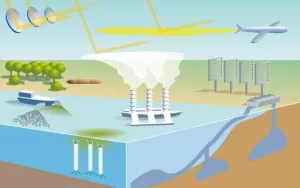Reasons Why Geoengineering Maybe A Bad Idea For Climate
Conventional carbon offsets, like those for preserving forests or planting trees, have a track record of not really lowering greenhouse gas emissions. As a divisive reaction to climate change known as solar geoengineering, a firm is already selling credits for its efforts to alter the planet’s capacity to reflect sunlight.

Yesterday, a letter from a group of eminent scientists was released, warning that this type of climate intervention is most likely never going to be ready for commercial deployment. James Hansen, a former NASA scientist who is currently at Columbia University and is well-known for raising the alarm about climate change in a 1988 statement to Congress, is a prominent name on the letter.
The letter calls for deeper investigation into the potential effects of solar geoengineering, which may lessen some of the risks associated with climate change or create new ones. Considering that doubt, the researchers refrain from formally endorsing solar geoengineering as a strategy to combat climate change. Without a “full, worldwide review” of its possible impacts and “international decision-making” over how to employ such technology, they do not believe it should be put into practice.

The controversial solar geoengineering business Create Sunsets was declared after attempting to inject reflective particles into the sky from Baja California, Mexico, and Reno, Nevada, this month. The goal is to replicate how solar radiation is reflected by volcanic explosion debris, which in the past has briefly chilled the earth. In reality, this looks like two co-founders igniting fungicide on a grill, filling weather balloons with reflecting sulfur dioxide particles from the resultant gas, and releasing the balloons.
“Cooling credits” from Create Sunsets are offered for sale for $10 for every gramme of sulfur dioxide released. The “warming impact of 1 tonne of carbon dioxide for 1 year” is meant to be countered by each gramme. Yet, the corporation isn’t making any appreciable changes to the climate. First off, it produced too little sulfur dioxide to make a dent in the billions of tonnes of pollutants that fossil fuel combustion releases annually. Moreover, Create Sunsets is unsure if the reflecting particles it released really reached the stratosphere, where they are meant to perform their function because it hasn’t been able to get precise height data on the five balloons it has launched so far.

The balloon releases of Create Sunsets primarily succeeded in offending individuals who genuinely want to see a more honest investigation into geoengineering. “There can be no tolerance for peddling snake oil,” reads a February 13th news release from the NGO SilverLining that promotes geoengineering research. “SilverLining firmly opposes Make Sunsets’ unauthorized atmospheric discharges of material and its marketing of false “cooling credits”.”
Also, see
DJI Discontinued Drone Detecting System Feature
Follow us on Instagram – here

1 Comment